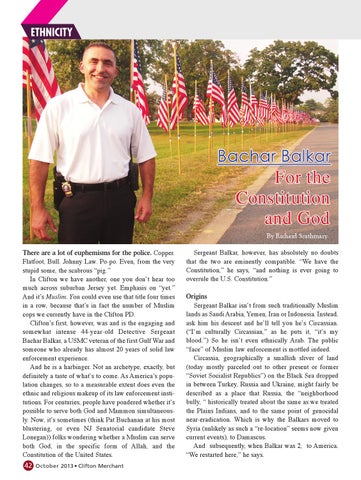ETHNICITY
By Richard Szathmary There are a lot of euphemisms for the police. Copper. Flatfoot, Bull. Johnny Law. Po-po. Even, from the very stupid some, the scabrous “pig.” In Clifton we have another, one you don’t hear too much across suburban Jersey yet. Emphasis on “yet.” And it’s Muslim. You could even use that title four times in a row, because that’s in fact the number of Muslim cops we currently have in the Clifton PD. Clifton’s first, however, was and is the engaging and somewhat intense 44-year-old Detective Sergeant Bachar Balkar, a USMC veteran of the first Gulf War and someone who already has almost 20 years of solid law enforcement experience. And he is a harbinger. Not an archetype, exactly, but definitely a taste of what’s to come. As America’s population changes, so to a measurable extent does even the ethnic and religious makeup of its law enforcement institutions. For centuries, people have pondered whether it’s possible to serve both God and Mammon simultaneously. Now, it’s sometimes (think Pat Buchanan at his most blustering, or even NJ Senatorial candidate Steve Lonegan)) folks wondering whether a Muslim can serve both God, in the specific form of Allah, and the Constitution of the United States. 42 October 2013 • Clifton Merchant
Sergeant Balkar, however, has absolutely no doubts that the two are eminently compatible. “We have the Constitution,” he says, “and nothing is ever going to overrule the U.S. Constitution.” Origins Sergeant Balkar isn’t from such traditionally Muslim lands as Saudi Arabia, Yemen, Iran or Indonesia. Instead, ask him his descent and he’ll tell you he’s Circassian. (“I’m culturally Circassian,” as he puts it, “it’s my blood.”) So he isn’t even ethnically Arab. The public “face” of Muslim law enforcement is mottled indeed. Circassia, geographically a smallish sliver of land (today mostly parceled out to other present or former “Soviet Socialist Republics”) on the Black Sea dropped in between Turkey, Russia and Ukraine, might fairly be described as a place that Russia, the “neighborhood bully, “ historically treated about the same as we treated the Plains Indians, and to the same point of genocidal near-eradication. Which is why the Balkars moved to Syria (unlikely as such a “re-location” seems now given current events), to Damascus. And subsequently, when Balkar was 2, to America. “We restarted here,” he says.
